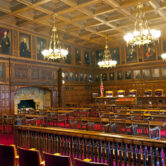WASHINGTON (CN) — With only weeks to go before the Supreme Court is expected to rule on a landmark case that could end affirmative action, researchers announced Thursday that the majority of Americans could support that result.
The Pew Research Center released findings Thursday that 50% of Americans disapprove of colleges using race and ethnicity in admissions decisions. The study concludes that only 11% of Americans strongly approve of the practice, with nearly three times as many strongly disapproving.
Last fall the high court sat for a marathon oral argument session to examine the use of affirmative action at the University of North Carolina and Harvard. The practice has been in use for over four decades, starting when the Supreme Court green-lit the use of race in college admissions in Regents of the University of California v. Bakke. In the 2003. case Grutter v. Bollinger, the court reaffirmed the use of affirmative action policies at the University of Michigan Law School. Since then the court has reaffirmed Grutter twice, with the last time coming only six years ago.
A group called Students for Fair Admissions claims that Harvard and UNC's reliance on racial balancing in the place of race-neutral alternatives violates the 14th Amendment and Title VI of the Civil Rights Act. The group sued both universities in 2014. Courts found that both universities’ policies complied with the court’s precedents, and the Supreme Court consolidated the two cases, bypassing the next step in the UNC case, after Harvard prevailed on appeal.
As with other Supreme Court cases that grab national attention, affirmative action has divided Americans along party lines. The latest Pew study shows that, while nearly three-quarters of Republicans and Republican-leaning independents disapproved of affirmative action policies, 54% of Democrats and Democratic leaners approved.
Those polled were more than twice as likely to say looking at race made the admissions process less fair, with only 17% of people saying it did not affect the process at all.
Americans were divided, however, on how tools to increase diversity in education impacted students’ educational experiences: 27% said it made it better, while 26% said it was worse.
Public polling is unlikely, however, to sway the eventual ruling from the justices. While the justices seemed all but certain during October oral arguments to overturn the use of affirmative action policies, the extent to which they do so is uncertain.
“The greatest likelihood is that, in some way or another, the court is going to reverse direction on affirmative action,” Frederick Lawrence, a distinguished lecturer at Georgetown Law, said in a phone interview. “Exactly what that means is what we're gonna have to find out.”
On one side of the spectrum, the court could say using race in any way would be unconstitutional. This would force schools to figure out how to eliminate race from both their admissions policies and any kind of academic program. These could include scholarships or fellowship programs.
Some universities have already been barred from using race in admissions. When a California law blocked schools from using affirmative action policies, colleges saw a 50% drop in minority enrollment.
The schools have attempted to use race-neutral policies to combat these effects, but those two could be a risk in this case. Race-neutral policies with the intention of increasing diversity are already being challenged. In Virginia, a group of parents has brought a challenge to a policy at an elite high school that has increased diversity by other means outside of race.
Last year the justices allowed the policy to remain in place, and the Fourth Circuit recently upheld the school’s use of diversity efforts. In the most extreme possible outcome, however, the justices in the affirmative action case could say any effort to increase diversity would be unconstitutional.
What the justices say about academic freedom could also carry heavy consequences. Universities are generally given prerogatives to determine their own academic missions.
“The two following questions sometimes get run together as if they were the same question and they are not,” Lawrence said. “One is should schools all engage in race-conscious admissions? The other is should schools be free to do that in order to accomplish their mission as they understand it based on their own academic goals? That's a very different question.”
The justices could overturn the academic policy of affirmative action, but how they do so will impact universities’ academic freedom.
“Should different schools be free to do this in different ways,” Lawrence asked. “I'm sure there are plenty of schools that say we have no interest in race-conscious admissions; we look at the math SAT, and we want you to know as many 800s as we can get because that's what we do here. That’s their mission. The schools should be free to accomplish their mission. That's the academic freedom piece of this.”
The Supreme Court will rule on this case before the end of June.
Subscribe to Closing Arguments
Sign up for new weekly newsletter Closing Arguments to get the latest about ongoing trials, major litigation and hot cases and rulings in courthouses around the U.S. and the world.









